I've done German comics, I've done Greek comics...but have I done Mexican comics? Let's take a look at Fantastic Four #84 (1969), in the familiar English:
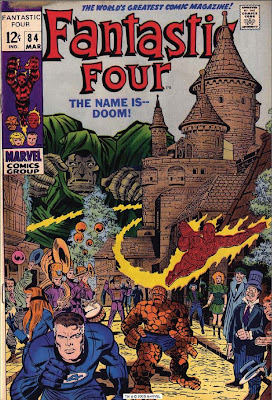 And now the Mexican version:
And now the Mexican version:
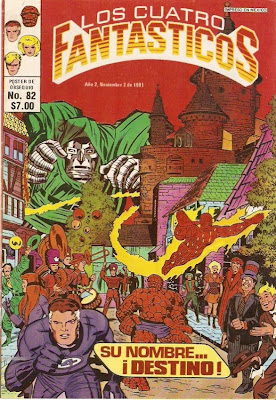 Wait a minute...that can't be the right translation, can it? Here's the back cover:
Wait a minute...that can't be the right translation, can it? Here's the back cover:
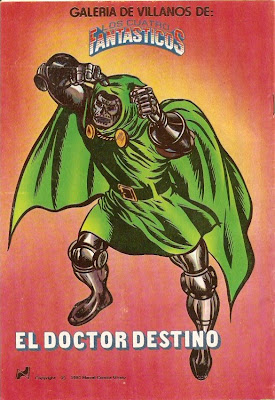 Yup...although Google translator and Alta Vista Babelfish both disagree, the translators of this issue thought the proper translation of Doctor Doom is Doctor Fate (or Doctor Destiny).
Yup...although Google translator and Alta Vista Babelfish both disagree, the translators of this issue thought the proper translation of Doctor Doom is Doctor Fate (or Doctor Destiny).
These guys do know they're doing Marvel, right?
One more difference worth noting. Here's the original splash page:
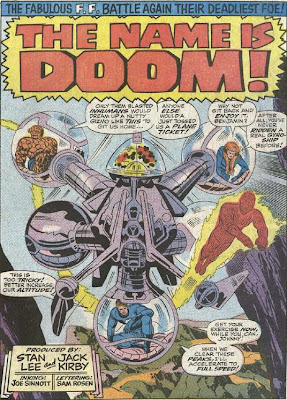 And the Mexican:
And the Mexican:
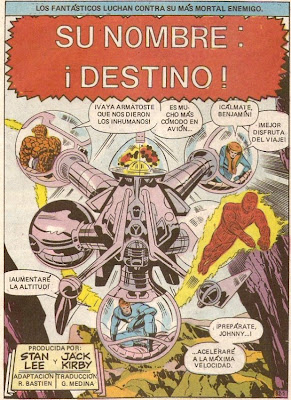 Really makes you appreciate a good letterer, eh? It's surprisingly off-putting to see an entire issue lettered by typewriter.
Really makes you appreciate a good letterer, eh? It's surprisingly off-putting to see an entire issue lettered by typewriter.
And to my poor Mexican compatriots--in 1981 you were getting reprints from 1969 passed off as new? Man, that sucks...
 And now the Mexican version:
And now the Mexican version: Wait a minute...that can't be the right translation, can it? Here's the back cover:
Wait a minute...that can't be the right translation, can it? Here's the back cover: Yup...although Google translator and Alta Vista Babelfish both disagree, the translators of this issue thought the proper translation of Doctor Doom is Doctor Fate (or Doctor Destiny).
Yup...although Google translator and Alta Vista Babelfish both disagree, the translators of this issue thought the proper translation of Doctor Doom is Doctor Fate (or Doctor Destiny).These guys do know they're doing Marvel, right?
One more difference worth noting. Here's the original splash page:
 And the Mexican:
And the Mexican: Really makes you appreciate a good letterer, eh? It's surprisingly off-putting to see an entire issue lettered by typewriter.
Really makes you appreciate a good letterer, eh? It's surprisingly off-putting to see an entire issue lettered by typewriter.And to my poor Mexican compatriots--in 1981 you were getting reprints from 1969 passed off as new? Man, that sucks...

4 comments:
Well, I looked in my handy Webster's New World Dictionary, and it gives the following meanings for the noun "doom" [with a little EMPHASIS from me]:
"1. orig., a statute; decree
2. a judgment; esp., a sentence of condemnation
3. DESTINY; FATE
4. tragic FATE; ruin or death
5. Judgment Day"
I would guess the Mexican translators knew what they were doing; also note that like the English "Doctor Doom", the Spanish "Doctor Destino" is an alliterative name (in the Mighty Marvel tradition). When I tried babelfish and google, I got "condenación" and "perdición" as Spanish translations for "doom", neither of which begins with a "D".
BTW, as far as I know the French name for Doctor Doom is "Fatalis".
BTW2, in German, Doctor Doom was first translated as "Doktor Unheil", but later they changed it back to "Dr. Doom", even though "Doom" is just a meaningless assemblage of letters in German and would of course be pronounced somewhat like the English word "dome".
It strikes me as overly pessimistic, not to mention fatalistic, to say that "fate"="doom," menshevik. But then again, maybe that's just me.
And since they didn't feel the need to keep the alliteration from Fantastic Four for "Cuatro Fantasticos," I'm not sure that should have been the overriding concern in changing Doom's name to that of a DC super-hero...
That pessimism you decry may be exactly what happened in the history of the English language with the word "doom". In Old and Middle English the word, then usually spelled "dom" meant "what is laid down" or "decree" (Doomsday is of course the Day of Judgment, when according to scripture not everybody will be doomed in a modern, entirely negative sense), and only with the passing of history did the word become darkened the way it did with the emergence of new, more negative meanings. I would assume that the fact that the English language later absorbed two words that meant pretty much the same concept, "fate" (from Latin) and "destiny" (from French and ultimately also from Latin), that enabled these differentiation to evolve, where "fate" is pretty neutral, "destiny" usually positive and "doom" usually negative.
As for your other argument - is there another word for "four" in Spanish that handily begins with an "f"? Or another Spanish word for "fantastic" that begins with a hard "c"? I don't know, but I would guess the answer to both questions is No. So as much as they would have wanted to keep the alliteration, it would have been impossible unless you simply left the name untranslated (and thus meaningless to young readers who speak only Spanish).
Two other considerations:
The word "destino" is a bit longer than "doom", but it is still shorter than "perdición" or "condenación" (which can come in handy with a smaller speech-balloon).
Doctor Doom's castle is decorated in many places with big, gothic "D's"; choosing a name that begins with a different letter would require changing the artwork and not just the text in the speech-balloons, thought-bubbles and caption-boxes.
While I was at it, I took a look at your 2007 postings on German Marvels and I thought I'd add a little info (maybe you already got it from someone else, but who knows?)
The problem with translating the name "Daredevil" into German is that while there are German words for "daredevil", they do not include the element "devil", while of course the German word for "devil", "Teufel", begins with the letter "T", not "D". But the costume has these devil-horns, so I guess that it kind of made sense to call him "der Dämon" in German. IIRC, there even were early issues where the "DD" on the red costume was retouched to be just a "D".
However, they later went with the English name instead of "der Dämon"; I remember a friend of mine telling me that he first pronounced that unfamiliar word the way it is spelled (something like "duh-ray-de-vil"). BTW, in the very first German translations (produced by a different publisher), Daredevil was called "Devil-Man".
While "Fantastische Vier" may not alliterate in writing, it does in spoken German (the "v" in "vier" is pronounced as "f"). It was probably just as well that it shortens to "FV", because back then, when young German comic readers saw the letters "FF", they would have thought of the then very popular children's series "Fix und Foxi" (about two funny-animal foxes). (And "MM" stood for "Micky Maus" and "DD" for "Donald Duck" (pronounced "donalt dook")).
At the time the German translation of the Fantastic Four was published, "fantastisch" would have been marked as incorrect by many teachers and proof-readers, they would have insisted on spelling them "Phantastische Vier".
Die Fantastischen Vier later (1986) also became the name of a famous (at least in Germany) German rap/hip-hop band.
And in case you're wondering, "das eindrucksvollste Superhelden-Team der Welt" means "the most impressive superhero team in the world".
"Jetzt geht's rund" is a common idiomatic expression (roughly corresponding to "action time!"), so it's not really a good translation for "It's clobberin' time!"
Post a Comment